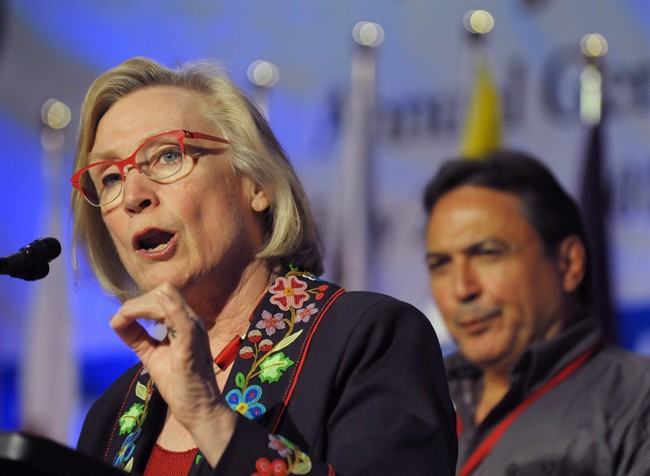Reports that women in and around Saskatoon were being coerced into tubal ligation procedures are evidence of racism in a health-care system that remains biased against Aboriginal women, Canada’s Indigenous affairs minister says.

In an interview with The Canadian Press, Carolyn Bennett called last week’s report “completely troubling” and a sign that some doctors are still willing to project onto certain patients what they consider an “optimal family size.”
READ MORE: National review urged over coerced sterilization of Indigenous women
“It is a very paternalistic approach,” Bennett said.
“I think that we yet again are confronted with the racism in all of our institutions.”
The report was researched and compiled by Yvonne Boyer, a lawyer and a Canada Research Chair at Manitoba’s Brandon University, and Dr. Judith Bartlett, a physician and researcher.
They documented how some Indigenous women from Saskatoon and the surrounding area were coerced into having their Fallopian tubes clamped or severed after giving birth in hospital.
Most of the women who were interviewed for the report either did not recall consenting to the procedure, or did so because they were exhausted and too overwhelmed to fight any longer, the researchers found.
READ MORE: Saskatoon Health Region failed Indigenous women, report into unwanted tubal ligation finds
Their report also suggests the tubal ligations were justified as an effort to help Indigenous women manage the size of their families.
“The doctors and nurses say, ‘It’s for your benefit,”‘ one woman told the investigators. “‘You have all these children. Enjoy her while you have her.'”
In response to the findings, the Saskatoon Health Region said it deeply regrets what happened, acknowledging it failed to treat the women with the respect, compassion and support they deserve.
It requested the external review after patients went to the media to raise awareness about what they experienced.
WATCH BELOW: Saskatoon Health Region apologizes for tubal ligations

Bennett, a physician herself, said discrimination in health demands urgent attention, noting it can be very difficult for patients to deal with health care providers who have an unconscious bias.
She also pointed to a 2015 report, entitled First Peoples, Second Class Treatment, that explored racism in the health-care system and recommended improving the collection of Indigenous health data to prevent racism from causing disparities in care.
Indeed, allegations of racially motivated mistreatment are not limited to police and the justice system, Bennett said.
“It is in my profession, too,” she said. “I think everybody is very aware that it is not just the social determinants of health that are responsible for the gaps in health outcomes, but actually the quality of care they receive.”
Boyer and Bartlett suspect the experience of the women in Saskatchewan is likely not exclusive to the province, adding a broader look would help determine the extent to which the problem exists elsewhere in Canada.
Indigenous women who shared their stories for the report are also seeking a national review, they added.
- Life in the forest: How Stanley Park’s longest resident survived a changing landscape
- ‘Love at first sight’: Snow leopard at Toronto Zoo pregnant for 1st time
- Carbon rebate labelling in bank deposits fuelling confusion, minister says
- Buzz kill? Gen Z less interested in coffee than older Canadians, survey shows



Comments